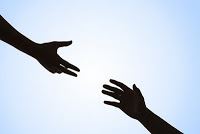Being alone
Friday, March 25, 2011
As we’ve seen in previous blogs, we get a lot from close loving relationships, and from the support of family and friends. But it’s also good to be on our own.
 Being alone gives us the chance to rest and recharge our batteries. When times are tough, it helps us get away from difficult situations, difficult people. Have you ever had a duvet day, when you just stay in bed and hibernate? Liberating! Being alone gives us the chance to rest and recharge our batteries. When times are tough, it helps us get away from difficult situations, difficult people. Have you ever had a duvet day, when you just stay in bed and hibernate? Liberating!
Being alone also gives us time to reflect, and develop our creativity and imagination. As Libby Brooks wrote in the Guardian recently, ‘an an individual's capacity to be alone contentedly is as much a mark of maturity as the ability to sustain relationships with others’.
Do you feel able to be on your own? Or do you worry that you couldn’t cope, that you’re not strong enough? You’d disappear, sink without trace, get hopelessly lost, if your partner (or your parent, or whoever you rely on) was not there to look after you.
Or do you believe that you have to stay there? You have no choice. You have to accept all the hassle, the abuse, the violence that your partner is dishing out to you. It’s your fault. It’s what you deserve.
Not true. Absolutely not true.
You are capable. You have the right to be on our own. You deserve better than that. You are stronger than you fear. Like Gloria Gaynor, you will survive.
Or is your life so busy, so committed to others that you have no time for yourself? I’m thinking particularly of mothers with young children, but it can also be a problem for people trying to make their way in the world of work. Having a new baby is - usually - a wonderful experience. But sometimes the pressure, the responsibility, the relentless, bone-crushing, mind-numbing weariness is overwhelming, suffocating.
It is so important, when you can, to carve out some time for yourself. As the advert puts it - time, dedicated to you.
Being alone is positive and important. Being alone gives us the opportunity to attend to what is troubling us, to begin processes of healing.
One way of doing this is through mindfulness.
 Jon Kabat-Zinn brings Buddhist teaching and Western science together in mindfulness meditation. This involves attending to our experiences in a non-judgmental manner. It is about being fully in the present moment, without judging or evaluating it, without reflecting backwards on memories, without worrying about the future, without trying to solve problems or avoid unpleasant aspects of the present. It is about maintaining awareness moment by moment, disengaging ourselves from strong attachment to beliefs, thoughts, or emotions. It helps us gain emotional balance, and well-being. Jon Kabat-Zinn brings Buddhist teaching and Western science together in mindfulness meditation. This involves attending to our experiences in a non-judgmental manner. It is about being fully in the present moment, without judging or evaluating it, without reflecting backwards on memories, without worrying about the future, without trying to solve problems or avoid unpleasant aspects of the present. It is about maintaining awareness moment by moment, disengaging ourselves from strong attachment to beliefs, thoughts, or emotions. It helps us gain emotional balance, and well-being.
People living with chronic pain and cancers have found mindfulness helpful. So have people with depression. Mark Williams, a psychologist from Cambridge, has shown that mindfulness meditation increases the well-being of people who have suffered several episodes of depression.
 0
Like
Published at 10:58 AM Comments (0)
0
Like
Published at 10:58 AM Comments (0)
What if you don’t feel at home?
Friday, March 18, 2011
Maybe you used to feel at home, but you don’t anymore.
This is a big problem for people who migrate from one country to another. For me, it was very difficult leaving my home in Ireland when I was 11, and finding my way in a boy’s boarding school in England. It is much worse for people who are forced to leave their homeland and travel many thousands of miles, to escape from poverty or political danger.
Here's how someone moving suddenly from Vietnam to Australia describes the shock of the change in her life. She sees Melbourne as a cold place with empty streets, and wonders how she can possibly start a new life in this strange country:
‘Oh, my first impression was that it was so cold…It was…cold. From Malaysia where it was hot, we had on only light clothing. So it was terribly… cold… It was on a Saturday that we arrived; there was no one in the city. … I thought how come there were no people in this country? The streets were deserted. I thought now I was in another country, and I did not know English, I did not know how I would start a new life. That was my continuing worry.’
[You can read more about this person and people like her, on DOI: 10.1111/j.1467-9566.2009.01228.x ]
We are told that immigrants should adapt to the ways of their new homeland as quickly as possible. That’s what I did at boarding school. I lost my Dublin accent and became as English as everyone around me. But that meant losing touch with my past self, my past friends. It was alienating.
If it is possible, it makes much more sense to keep in touch with home, to live with people from your own background, speak your own language, eat the food you're used to, do the things you're used to doing. Once you feel safe and comfortable, then look around and see what new opportunities there may be for you in your new country, your new home.
Or maybe you’ve never felt at home - anywhere, anytime. Maybe your life has been so difficult, so troubled, that you’ve never felt safe. Maybe people who were supposed to care for you failed to do so, leaving you exposed to danger and abuse. Or maybe it was the people who were supposed to care for you who were cruel, or abused you.
This is very tough, very damaging. It’s one of the hardest things in the world to deal with.
Sometimes the only place you can feel safe is inside your head. Sometimes you need to create an inner world where nobody can get at you, where pain doesn’t register, where you can escape from the turmoil outside.
This can be fine. We all need a refuge, and if inside your head is the only one you’ve got just now then use it, and enjoy it.
Problems arise, though, if your inner world becomes a prison cell - if you find you can’t escape from it even when you want to, even when the danger has passed. If that’s happening to you, you’ll probably need some expert help to find a way out.
As there was a way in, there is always a way out.
 0
Like
Published at 11:35 AM Comments (0)
0
Like
Published at 11:35 AM Comments (0)
(Where) do you feel at home?
Friday, March 11, 2011
What does the word home mean?
Home is where you belong. Home is where you can be yourself, where you don’t need to pretend or put on an act, or try too hard. Home is where you feel understood and appreciated, warts and all.
Home can be a place, it can be people, or it can be somewhere in your head out of harm’s way. Home is comfortable. Home is where you can rest. Home is where you feel safe.
Feeling at home is essential for our well being.
Evidence for this comes from John Bowlby and Mary Ainsworth, whose attachment theories grew out of studies of children and their caregivers. Cindy Hazan and Phillip Shaver extended them to include loving relationships as adults. Relationships - with people who care for us when we are little, with friends and lovers when we are older – provide us with a safe haven, a secure base. They help us face surprises, opportunities, and tough times. It’s a bit like the ordinary magic that I wrote about in an earlier blog.
For me, it is not just people. Places are also important in helping us to feel at home.
Our sense of where home is can vary over time. Without it we are in danger of losing our way, losing our sense of self, losing our ability to carry on.
 As a small boy growing up in the south of Ireland, I feel at home on my mother’s knee in the kitchen, listening to the Shipping Forecast on the BBC’s Home Service, which always comes just before Listen with Mother starts at quarter to two ; I feel at home snuggling up to Dog Dover, a big cuddly sheepdog who lives on the farm next door.
As a small boy growing up in the south of Ireland, I feel at home on my mother’s knee in the kitchen, listening to the Shipping Forecast on the BBC’s Home Service, which always comes just before Listen with Mother starts at quarter to two ; I feel at home snuggling up to Dog Dover, a big cuddly sheepdog who lives on the farm next door.
A few years older, living by the seaside, I feel at home jumping off rocks on the beach with my two brothers; tucked up in bed reading Dr Doolittle; and eating sausages on sticks by the fire on a Sunday evening.
In my late 20s, going through a difficult divorce and moving frequently between two cities, my sense of home almost disappears. The only place it survives is in my car, a yellow Nissan, driving up and down the M6. I feel safe there, protected for a few hours from all the hassles and worries of the big, complicated world outside.

Now, I feel at home in lots of places. Sitting in my comfortable armchair watching test cricket on the TV. In my study (where I am now), looking at the autumn leaves in our back garden. In bed in our French mill, with the window wide open, enjoying the murmur of the river at it rushes over the weir. But mostly, I feel at home wherever Sue is.
What about you? Where did you feel at home when you were little? Where do you feel at home now?
Or maybe you don’t. Maybe you’ve felt at home in the past, but can’t get back to there. Or maybe you’ve never felt at home, never felt safe anywhere..... I’ll have some more for you in my next blog.
 0
Like
Published at 11:36 AM Comments (1)
0
Like
Published at 11:36 AM Comments (1)
Reaching out
Friday, March 4, 2011
We are usually rather good at leading our lives. We are happy, or at least content, most of the time. When times are tough we can often find ways to get through, building on our own strengths and the support of those around us.
But sometimes life gets so difficult that our life hungry stupidity starts to fade. Our ordinary magic and personal medicine aren’t enough. Our coping skills are snowed under. Our well being recipes are insufficient. We could do with some extra help.
One of the problems with giving advice on self-help (as I’ve done so far in this blog), is that it can seem to imply that we shouldn’t look elsewhere for help. ‘I must deal with this,’ we tell ourselves. ‘If I can’t then it’s a sign of weakness, it just shows what a wimp I am’. We start shouting at ourselves: ‘Stand on your own two feet’. ‘Just get on with it.’ ‘Don’t trouble the doctor, she’s too busy with people who are really sick.’
 Sometimes we are overwhelmed by troubles. Some times are so tough that we can’t see any way out. We need to be able to reach out to someone with authority, someone with expertise or skill, and say ‘I can't do this by myself. Please, lend me a hand’.
Sometimes we are overwhelmed by troubles. Some times are so tough that we can’t see any way out. We need to be able to reach out to someone with authority, someone with expertise or skill, and say ‘I can't do this by myself. Please, lend me a hand’.
And that is OK. In fact it is more than OK. It is fine. As human beings, as persons, as citizens, we are entitled. We deserve help. We have the right to reach out.
That depends on who has the ability to help us solve our particular problems. It could be a doctor, a psychologist, a lawyer, a priest, an Imam, or maybe a trade union official, or a good plumber. Sometimes our choice will be affected by whether we need (and can afford) to pay.
Most important of all, reaching out depends on who we can trust.
‘A lot of my problems go back to childhood’, Sarah told me. ‘I was sexually abused as a child, by a friend of the family. My mother did nothing to protect me. Dad died when I was fifteen. I became anorexic. I just couldn’t deal with it all.’ She had ECT, drugs, the lot. Nothing worked. Eventually she met Adele, a psychologist who helped her work through a lot of her problems. ‘I could trust Adele’.
So when things went wrong again, she had to decide who’d be best to help.
‘In January I was upset’, said Sarah. ‘I thought shall I go to the doctors - or shall I go to the health centre to see if Adele’s there? It's not like it was a physical problem, or a medical emergency, maybe the doctors wouldn’t think they had time to deal with a problem like this. I felt they wouldn't have taken my distress seriously enough. It goes back to past experiences – ‘there's nothing the matter with you, go home and take a Valium’, being fobbed off. At that time I was feeling very vulnerable, so I plumped for Adele as the one with the better chance of getting my needs met. Also it meant I could maintain some control over the situation’.
Sarah has it exactly right. When we are reaching out for help, it’s risky. We need somebody competent, but it’s also got to be somebody we can trust. Trust that we’ll be taken seriously, that we’ll get our needs met, and that we can keep some control.
 0
Like
Published at 11:12 AM Comments (2)
0
Like
Published at 11:12 AM Comments (2)
Spam post or Abuse? Please let us know
|
|